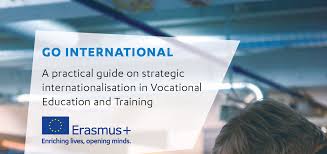Principles of Writing an Erasmus Plan
In a three-part series, Elva Duggan from our Programme Support and Development Team offers advice for organisations writing an Erasmus Plan. Each part is based on guidance from Go International: A Practical Guide on Strategic Internationalisation in Vocational Education and Training.
The Erasmus+ and European Solidarity Corps programmes come to the end of their current programme cycle in 2020. Their successor programmes will run from 2021 to 2027, and aim to be more inclusive, accessible and sustainable. Organisations that want to be involved in the Mobility strands of the new programmes can now apply for ‘Accreditation’. This encourages organisations to plan their projects strategically, and assures participants that they will have a high-quality mobility experience. The new Erasmus Accreditation brochure from the European Commission has all the details you will need.To apply for accreditation, you must describe your ‘Erasmus Plan’. This sets out what you aim to achieve by organising mobilities, how they will be arranged, and should cover at least two years. The application form guides you through each section, but we’d also bring your attention to the valuable resource Go International: A Practical Guide on Strategic Internationalisation in Vocational Education and Training.
Go International was originally produced by the Finnish National Board of Education and the Centre for International Mobility (CIMO). It has been redeveloped by the Finnish Erasmus+ National Agency and supported by a team of representatives from the Danish, Dutch, Hungarian and German Erasmus+ National Agencies in VET. While there is a strong focus on VET, the principles can also be applied to the School Education and Adult Education sectors. This post summarises some key points from the guide.
Principles of Writing an Erasmus Plan
- know your starting point and build on that
- establish a realistic, but also sufficiently ambitious, vision for the future
- involve and empower students, staff and all stakeholders to take part
- stay flexible with your strategy and be ready to adapt to changes if you want to achieve your goals.
Why Plan Strategically for Your European Activities?
- It will help staff and students see how international cooperation relates to the core activities and development of their institutions.
- It will give direction to activities and make them more systematic, which will help in managing them and help staff in their practical work.
- It will ensure there are enough resources to carry out the activities in practice, that cooperation is in line with the overall strategies of the organisation, and that all staff members are aware of these goals and activities.
This figure is a simplified model of strategic planning as developed by the authors:

Go International also defines and explores a number of key concepts in the Erasmus Plan. The following has been condensed and lightly paraphrased: please see the guide for full detail.
The Operating Environment
“Everything that affects the operations of an organisation, internally and externally. The starting point for development work in an organisation is to analyse the operating environment: the constants and the changes influencing it. These could include education and training policies, demographic changes, immigration, the labour market and so on. (It’s also important to) look at what has been done so far in internationalisation. What is the status quo? What projects have been carried out? Which partnerships are in place? What is there to build on?”
Vision
“Where an organisation wants to be in the future, based on its purpose (mission) and values. A solid vision shows staff and students what the goals of the organisation are, and where their efforts should be directed in the future. A good vision both inspires and guides, but is rooted in reality and looks beyond what is currently in existence.”
Mission
“The mission answers the question: Why are we here? It justifies the existence of an organisation and has an important role in guiding its operations.”
Core Skills
“The knowledge and competences that distinguish the organisation from others – the true expertise of an organisation. Core skills help to achieve an advantage or even the ‘competitive edge’ of an organisation, at least locally or regionally, and add special value to students, employers and other stakeholders.”
Values
“Values express what is important in an organisation and what viewpoints or ethical standpoints its operations are based on. Values steer the way students, staff and organisations operate as a whole. Values may include, for example, equality, tolerance, cooperation, openness, employer orientation and student orientation.”
Goals
Goals are the core element of the internationalisation strategy. They link the mission with the vision of the organisation.
Goals should:
- be based on a realistic picture of the past, present and future; but also
- challenge the status quo, so that the organisation is pushed to develop further.
However, the authors warn that “an organisation should not establish too many strategic goals for a specific period as the vision might become blurred. It is advisable to keep the goals to between five and six, and certainly no more than eight.”
The authors advise that every goal should also be linked to an expected output, outcome or impact. This should be linked with a quantitative or qualitative indicator (see chapter 5.5).
Action Plan
Last, but not least, the authors state that an action plan should be drawn up to “outline how an organisation’s strategy will be implemented. Its purpose is to turn the strategic goals into operational targets and related actions, and to improve the quality of the work and the outputs. The action plan usually covers such issues as operational targets/actions, procedures and resources for the agreed actions, as well as the related indicators. An important aspect is also to establish clear indicators or performance targets.” (see chapter 5.5).
Léargas would like to thank the Finnish National Agency for Education for leading the development and co-ordination of this document. The next part of this blog series will explore the role of the 'strategy journey' in writing an Erasmus plan.

